Table of Contents |
guest 2025-12-30 |
S1 - Introduction to Skyline for Targeting Peptides and Small Molecules: SRM/MRM and PRM
S2 - Advanced Topics in Skyline for Small Molecules
S3 - Introduction to Targeted Proteomics: SRM/MRM and PRM
S4 - Advanced Quantitative Proteomics: DIA and PTMs
All course schedules
Registration
Instructor List
The following instructors and speakers have agreed to contribute their expertise to the success of 2021 Skyline Online Course:
 |
Brendan MacLean Brendan worked at Microsoft for 8 years in the 1990s where he was a lead developer and development manager for the Visual C++/Developer Studio Project. Since leaving Microsoft, Brendan has been the Vice President of Engineering for Westside Corporation, Director of Engineering for BEA Systems, Inc., Sr. Software Engineer at the Fred Hutchinson Cancer Research Center, and a founding partner of LakKey Software. In this last position he was one of the key programmers responsible for the Computational Proteomics Analysis System (CPAS), made significant contributions to the development of X!Tandem and the Trans Proteomic Pipeline, and created the LabKey Enterprise Pipeline. Since August, 2008 he has worked as a Sr. Software Engineer within the MacCoss lab and been responsible for all aspects of design, development and support in creating the Skyline Targeted Proteomics Environment and its growing worldwide user community. |
|
 |
Michael J. MacCoss, Ph.D. Mike became interested in biomedical applications of mass spectrometry while working in Dr. Patrick Griffin’s protein mass spectrometry lab at Merck Research Laboratories. He obtained a Ph.D. with Professor Dwight Matthews and pursued a postdoc with Professor John R. Yates III. In 2004 he started the MacCoss lab at the University of Washington and it became obvious that while mass spectrometry data could be collected quickly and robustly, the lack of computational tools for the visualization and analysis of these data was a stumbling block. In 2009 he recruited Brendan MacLean with the goal of developing professional quality software tools for quantitative proteomics. Mike has worked closely with the Skyline development team and our outstanding group of laboratory scientists and collaborators to ensure that our software uses analytical approaches that have been thoroughly vetted by the mass spectrometry community. |
|
 |
Kendra Adams, Ph.D. Kendra is a Lab Research Analyst at the Duke Proteomics and Metabolomics Shared Resource studying small molecules. She works in collaboration with Dr. Carol Colton in the Department of Neurology at Duke University. She currently uses mass spectrometry to study Alzheimer’s disease in new mouse models. Kendra earned her Ph.D. in Dr. Francisco Fernandez-Lima’s Lab at Florida International University where she analyzed small molecules using LC-TIMS-MS. Her current research focuses on method development for targeted biomarker analysis and stable isotope tracing for Alzheimer’s disease. |
|
 |
Erin Baker Ph.D.
|
|
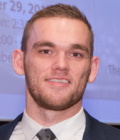 |
Natan Basisty, Ph.D. Nate is a postdoctoral fellow in Dr. Birgit Schilling’s lab in the Buck Institute for Research on Aging in California. He received his Ph.D. from the University of Washington, advised by Drs. Peter Rabinovitch and Michael MacCoss Dr. Basisty develops novel and specialized proteomic approaches to understand aging processes and age-related diseases, including the application of data-independent acquisition (DIA) or SWATH workflows to identify and quantify PTMs and secretomes, development of pipelines to comprehensively assess protein turnover rates, and cell-surface proteomics (surfaceomics). A major aim of his current work is to discover biomarkers of cellular senescence and develop translationally relevant approaches to study senescent cells in humans, enabled by the application of proteomics. Dr. Basisty has been recognized for his work investigating the role of protein turnover in mammalian aging and longevity using a combination of metabolic labeling, LC-MS/MS, and software tools. |
|
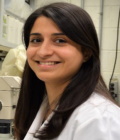 |
Aparna Baxi
|
|
 |
Weixian Deng Weixian is a Ph.D. graduate student at UCLA under the supervision of Drs. James Wohlschlegel and Kathrin Plath. He obtained his bachelor and master degrees from Jilin University in China, where he studied using targeted mass spectrometry for quantifying plant protein post translational modifications. In his Ph.D. research, he optimized a series of affinity purification-MS techniques and applied DIA method trying to i) quantify the interactome change of Yamanaka factors in induced pluripotent stem cells (iPSC) reprogramming and ii) to characterize long non-coding RNA (lncRNA) Xist's interactome in early embryo development. His goal is to improve the LC-MS based proteomics to gain better understanding in protein-involved gene regulation molecular events which are usually of low abundance in vivo. |
|
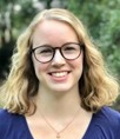 |
Kaylie Kirkwood Kaylie is a second-year graduate student at North Carolina State University working under the advisement of Dr. Erin Baker. Thus far, her research has focused on the development of lipid LC-IMS-MS libraries in Skyline and the application of these libraries to various clinical and environmental applications. Skyline was the first software Kaylie learned to use as an undergraduate researcher for small molecule detection including cyanotoxins, amino acids, and metabolomics profiling of amyotrophic lateral with Dr. David Muddiman. Its adaptability and interactive developers have allowed her to continue utilizing it in her current research. |
|
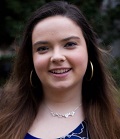 |
Lilian Heil Lilian is a PhD student in Genome Sciences interested in developing methods for the acquisition and analysis of quantitative proteomics data. She joined the department in the fall of 2019 after graduating from the University of North Carolina in the winter of 2018 with a B.S. in Chemistry. Before graduate school, she worked in the Hicks Lab at UNC for 2 years as an undergraduate trainee and for several months as a full time research assistant using mass spectrometry to identify and characterize novel bioactive peptides. There, she helped to discover and sequence a novel antimicrobial peptide from Amaranthus tricolor and developed a passion for mass spectrometry. |
|
 |
Thomas Lau, Ph.D. Tom is a Senior Research Scientist at Vertex Pharmaceuticals in Boston MA. There he leads efforts for proteomics within chemical biology. He began using mass spectrometry during his PhD research on cancer biomarkers at University College Dublin. Tom has over a decade of experience in proteomics and peptide quantification in both academic and drug discovery settings including previous positions at Celgene, Pfizer and the Broad Institute. His research aims to understand disease mechanisms and advance drug discovery by integrating mass spectrometry and other biological and chemical tools. |
|
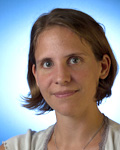 |
Christina Ludwig, Ph.D. Tina is heading the proteomics section at the Bavarian Center for Biomolecular Mass Spectrometry (BayBioMS) at the Technical University Munich (www.baybioms.wzw.tum.de). Her current research interests are focused on technical development projects related to targeted and data-independent mass spectrometry, including Selected Reaction Monitoring (SRM), Parallel Reaction Monitoring (PRM) and SWATH-MS. During her postdoc in the laboratory of Professor Ruedi Aebersold at the ETH Zürich Christina was involved in projects aiming for specific site-localization of post-translational modifications and estimation of absolute protein abundances from label-free, targeted mass spectrometric data. |
|
 |
Lindsay K. Pino, Ph.D. Lindsay is a postdoctoral researcher in Dr. Ben Garcia’s lab at the University of Pennsylvania where she uses quantitative mass spectrometry to study epigenetics. Before going to the University of Washington for graduate school, she spent two years in South Korea as a Fulbright scholar and three years working as a research associate in Dr. Steve Carr's Proteomics Platform at the Broad Institute of MIT and Harvard. She earned her PhD under the joint advisorship of Drs. Michael J. MacCoss and William Stafford Noble. There, she developed techniques for data independent acquisition mass spectrometry, in particular the challenges associated with scaling up quantitative mass spectrometry experiments. Her research interests are in the roles proteins play in nuclear organization and the maintenance of genomic stability. |
|
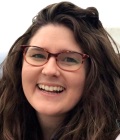 |
Deanna Plubell Deanna is a Ph.D. student in the MacCoss lab at the University of Washington. A portion of her research has been the use of data-independent acquisition to aid in peptide selection for targeted assay development. Her other research interests include the use of mass spectrometry techniques for detecting proteolytic cleavage activity and small endogenous polypeptides in neurodegenerative disease. Prior to joining the MacCoss lab, Deanna worked at Oregon Health & Science University where she used both discovery and targeted proteomics methods to investigate changes to adipose tissue and lipoprotein proteomes in cardiovascular and metabolic diseases. |
|
 |
Nick Riley, Ph.D. Nick is a postdoctoral researcher in Prof. Carolyn Bertozzi’s lab at Stanford University, where he is developing glycoproteomics tools to understand how cancer cells alter their cell surface glycoproteome to promote metastasis. Before Stanford, Nick earned his Ph.D. with Prof. Josh Coon at the University of Wisconsin-Madison. There he worked on mass spectrometry instrumentation and methodology to improve the characterization of both peptides and intact proteins. Most of his efforts focused on implementing activated ion electron transfer dissociation (AI-ETD) to improve sequencing information obtained from ETD MS/MS spectra, which ultimately led him to the intriguing world of glycobiology that he now studies in the Bertozzi group. |
|
 |
Julia Robbins Julia attended the University of Washington, graduating in 2018 with a BS in Biology. Under the tutelage of her many professors, Julia obtained an approximate knowledge of many biological concepts and an acute knowledge of approximately none (except perhaps invertebrate zoology). She began working in the MacCoss lab in January 2018, and her current focus is Alzheimer's Disease research in mice models and humans. Along with the freelance graphic design and scientific illustration she does on the side, she also designed and maintains the MacCoss lab website. |
|
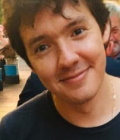 |
Juan Rojas Juan is a third-year Ph.D. student at Universität Leipzig under the tutelage of Prof. Dr. Ralf Hoffmann where he uses LC-IMS-MS to identify and quantify low abundance carbonylation PTMs in human plasma in search of potential biomarkers towards oxidative distress related diseases such as rheumatoid arthritis. During his study, comprehensive platforms, such as Skyline, that can integrate LC-IMS-MS and peptide identifications from multiple search engines have become indispensable for the progress of carbonylation PTMs. Prior to his stay in Leipzig (Germany), this Panamanian-born nomad obtained a BSc in Biochemistry at Florida State University (USA), worked as a mass spectrometry technician at INDICASAT-AIP (Panama), and obtained a MSc in Molecular Analytical Science at The University of Warwick (UK). |
|
| Pawel Sadowski, Ph.D. Pawel completed his Ph.D. in the field of quantitative proteomics at the University of Cambridge. During subsequent post-doctoral appointments at the New York University and at the University of New South Wales in Sydney he applied label-free and label-based approaches to study biomarkers, protein-protein interactions and PTMs. In 2013 Pawel joined Queensland University of Technology in Brisbane to lead Proteomics and Small Molecule Mass Spectrometry Core in the QUT Central Analytical Research Facility. He supervises research that utilizes LCMS and GCMS instrumentation. Pawel’s interest lays in leveraging the power of recent advancements in data acquisition strategies for MS-based proteomics to drive clinical veterinary research into the next generation. More recently, he has started using quantitative mass spectrometry to study metabolites and other small molecules. |
||
 |
Stoyan Stoychev, Ph.D. Stoyan currently holds a joint position as a senior researcher at the CSIR Molecular Diagnostics & Omics group (Pretoria, South Africa) as well as Head of Proteomics at ReSyn Biosciences. He started his career in 2008 as a post-doctoral researcher with the task of establishing mass spectrometry analytical facility after completing a Ph.D. in Structural Biology. Currently the main focus of this unit is the application of high-throughput DIA workflows in the space of clinical proteomics. The facility is part of the Diplomics network of academic, commercial and industrial labs supporting Oimcs research in South Africa. At ReSyn Stoyan is involved in the development of technology, products and wokflows focussed on bioseparation and mass spectrometry sample preparation. Stoyan has won numerous awards including two Technical excellence as well as a Team Impact award. |
|
 |
Lisa St. John-Williams Lisa joined the Duke Proteomics and Metabolomics Shared Resource as a Senior Research Analyst after a number of years as a Bioanalytical Project Manager at GlaxoSmithKline. Her primary focus at Duke has been to use skills in a variety of extraction and derivatization techniques to develop robust, high-throughput methods for quantitative bioanalysis to support both basic research and clinical metabolomics projects. |
|
 |
Chris Shuford, Ph.D. Chris is Technical Director for research and development at LabCorp’s Center for Esoteric Testing in Burlington, North Carolina. Chris received a B.S. in Chemistry at the Longwood University and obtained his Ph.D. from North Carolina State University under the tutelage of Professor David Muddiman, where his research focused on multiplexed peptide quantification using protein cleavage coupled with isotope dilution mass spectrometry (PC-IDMS). In 2012, Chris joined LabCorp’s research and development team as a scientist where his efforts have focused on development of multiplexed and single protein assays for clinical application, with particular interest around the effect of protein digestion on the throughput and accuracy of isotope dilution assays. |
|
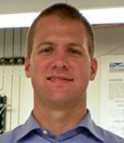 |
J. Will Thompson, Ph.D. Will is the Assistant Director of the Duke Proteomics and Metabolomics Shared Resource, and Assistant Research Professor in the Department of Pharmacology and Cancer Biology. He received his Ph.D. in Ultrahigh Pressure Liquid Chromatography from the laboratory of Dr. Jim Jorgenson at the University of North Carolina at Chapel Hill, and subsequently joined the Disease and Biomarker Proteomics group led by Dr. Arthur Moseley at GlaxoSmithKline. In 2007, Dr. Thompson assisted Dr. Moseley in founding the Duke Proteomics Core Facility, which as of winter 2017 has 10 full time scientists. Dr. Thompson has overseen the expansion of the group's efforts into small molecule and metabolomics analysis, which now represents roughly 40% of the work of the Shared Resource. His research in part focuses on application of novel proteomics and targeted metabolomics assays to clinical and basic science research applications, with special emphasis on Alzheimer's Disease. The Core has completed over 1200 projects for nearly 200 principal investigators since 2007, and works with investigators both inside and outside the Duke School of Medicine. |
|
 |
Fernando (Ralph) Tobias,, Ph.D. Ralph is a postdoctoral scholar in Dr. Amanda Hummon’s lab at The Ohio State University. He’s currently using a diverse assortment of mass spectrometry-based approaches such as proteomics and metabolomics to study colorectal cancer using multicellular tumor spheroids and patient tumor samples. He earned his Ph.D. under the supervision of Dr. Stephanie M. Cologna at the University of Illinois at Chicago, where he developed mass spectrometry imaging and lipidomics workflows to identify lipidomic changes in several neurodegenerative disease mouse models. His current research interests are developing streamlined sample preparation techniques and data analysis for mass spectrometry-based approaches to study human health. |
S1 - Introduction to Skyline for Targeting Peptides and Small Molecules: SRM/MRM and PRM
Description:
This course will address a range of targeted techniques using selected reaction monitoring (SRM) and parallel reaction monitoring (PRM) mass spectrometry approaches for targeted quantitative proteomics and other small molecule -omics. Session topics will include an introduction to setting up target lists for peptides and small molecules, basic importing and understanding targeted mass spectrometer data, absolute quantification, differential abundance testing, and a general focus on learning to use Skyline software effectively in your research. The instructor list includes researchers and the Skyline project lead, all with a wealth of combined experience in targeted and quantitative mass spectrometry, and both using and creating Skyline to meet the needs of diverse research questions.
Instructors: Brendan MacLean, Kendra Adams, Tina Ludwig, Will Thompson
Schedule:
Day 1 - Monday, April 12, 2021
- Introduction to targeted proteomics in Skyline
- The Skyline software ecosystem
- Targeted MS/MS (PRM) with peptides
- Absolute quantification and calibration curves for peptides
Day 2 - Tuesday, April 13, 2021
- Grouped study data processing
- Intro to small molecule research in Skyline
- Small molecule targets
- Small molecule quantification
S2 - Advanced Topics in Skyline for Small Molecules
Description:
While originally developed for targeted proteomics applications, Skyline is now a rapidly evolving tool for method development and data analysis of small molecule mass spectrometry data. Skyline supports workflows including MRM, PRM, and high-resolution DDA, DIA, and IMS-MS measurement of virtually any molecule. In this course, users will learn how to expand their Skyline horizons beyond those of amino-acid based peptides, to include virtually any molecule. The course will include but not necessarily be limited to the following topics: setting up new methods from transition lists and spectral libraries, building and evaluating metabolomics system suitability tests, performing collision energy and method optimization, mining high-resolution metabolomics data, ion mobility MS of lipids and building spectral libraries, analysis of GCMS data, analysis of isotope flux high-resolution MS data, and multiplexed calibrated quantitative methods.
This course assumes students will have a basic working knowledge of the Skyline software and how to use it, either through experience or by attending the Intro to Skyline course.
Instructors: Will Thompson, Kendra Adams, Pawel Sadowski, Erin Baker, Kaylie Kirkwood, Lisa St. John Williams
Schedule:
Day 1 - Thursday, April 15, 2021
- Advanced methods for small molecule research in Skyline
- Small molecule method development
- System suitability for small molecules
- Advanced small molecule quantification (multiplexed panels)
- Analysis of high resolution metabolomics data
Day 2 - Friday, April 16, 2021
- Ion mobility in proteomics and metabolomics
- Analysis of lipidomics data in Skyline
- Isotope incorporation / flux analysis in Skyline
- Gas chromatography-mass spectrometry analysis
- The future of small molecule analysis in Skyline
S3 - Introduction to Targeted Proteomics: SRM/MRM and PRM
Description:
The course schedule will address a range of targeted techniques using selected reaction monitoring (SRM) and parallel reaction monitoring (PRM) mass spectrometry approaches for targeted quantitative proteomics. Session topics will include an introduction to mass spectrometry and proteomics, system suitability, absolute quantification, differential abundance testing, and, of course, learning to use Skyline software more effectively in your research. The instructor list includes researchers from both academia and industry with a wealth of combined experience in targeted and quantitative proteomics and using Skyline to meet the needs of diverse research questions.
Instructors: Lindsay Pino, Aparna Baxi, Stoyan Stoychev, Nick Riley, Tom Lau
Schedule:
Day 1 - Monday April 19, 2020
- Introduction to targeted proteomics in Skyline
- The Skyline software ecosystem
- Targeted MS/MS (PRM)
- Absolute quantification and calibration curves
Day 2 - Tuesday April 20, 2021
- Manual data analysis
- Using indexed retention time (iRT)
- Grouped study data processing in Skyline
- Using Panorama and AutoQC
S4 - Advanced Quantitative Proteomics: DIA and PTMs
Description:
This course schedule will address mass spectrometry approaches for advanced quantitative proteomics including data independent acquisition (DIA) and post translational modifications (PTM), with topics spanning instrument method design and setup for DIA, processing DIA data within Skyline, special considerations for targeted quantification of PTMs, and, of course, learning to use Skyline software more effectively in your research. The instructor list includes researchers from both academia and industry with a wealth of combined experience in targeted and quantitative proteomics, and using Skyline to meet the needs of diverse research questions.
This course assumes students will have a basic working knowledge of the Skyline software and how to use it, either through experience or by attending the Introduction to Skyline course.
Instructors: Lindsay Pino, Juan Camilo Rojas Echeverri, Weixian Deng, Natan Basisty, Ralph Tobias, Deanna Plubell, Julia Robbins
Schedule:
Day 1 - Thursday April 22, 2020
- Introduction to data independent acquisition (DIA)
- Analysis of DIA data in Skyline
- DIA instrument setup
- Generating DIA-only libraries with EncyclopeDIA
- IMS filtering for DDA and DIA quantitation
Day 2 - Friday April 23, 2021
- Introduction to post transitional modifiers (PTMs)
- Carbonyl PTM walkthrough
- Skyline tips and tricks for PTM quantification
- Advanced process control for big data
- Open searching and DIA
All course schedules
Session 1 - Introduction to Skyline for Targeting Peptides and Small Molecules: SRM/MRM and PRM
Day 1 - Monday, April 12, 2021
9 am - 5 pm pm (All times EDT)
- Introduction to targeted proteomics in Skyline
- The Skyline software ecosystem
- Targeted MS/MS (PRM) with peptides
- Absolute quantification and calibration curves for peptides
Day 2 - Tueday, April 13, 2021
9am - 5:00 pm (All times EDT)
Session 2 - Advanced Topics in Skyline for Small Molecules
Day 1 - Thursday April 15, 2020
9:00 am - 5:00 pm (All times EDT)
- Skyline for small molecules
- Method transfer and quantification
- System suitability for small molecules
- Advanced small molecule quantification (multiplexed panels)
- Analysis of high resolution metabolomics data
Day 2 - Friday, April 16, 2021
9:00 am - 5:00 pm (All times EDT)
- Ion mobility in proteomics and metabolomics (iRT)
- Analysis of lipidomics data in Skyline
- Isotope incorporation / flux analysis in Skyline
- Gas chromatography-mass spectrometry analysis
- The future of small molecule analysis in Skyline
Session 3 - Introduction to Targeted Proteomics: SRM/MRM and PRM
Day 1 - Monday April 19, 2021
9am - 5:00 pm (All times EDT)
- Introduction to targeted proteomics in Skyline
- The Skyline ecosystem
- Targeted MS/MS (PRM)
- Small molecule method transfer and quantification
- Absolute quantification and calibration curves
Day 2 - Tuesday April 20, 2021
9am - 5:00 pm (All times EDT)
- Maual data analysis
- Using indexed retention time (iRT)
- Grouped study data processing in Skyline
- Using Panorama and AutoQC
Session 4 - Advanced Quantitative Proteomics: DIA and PTMs
Day 1 - Thursday April 22, 2021
9am - 5:00 pm (All times EDT)
- Introduction to data independent acquisition (DIA)
- Analysis of DIA data in Skyline
- DIA instrument setup
- Generating DIA-only libraries with EncyclopeDIA
- IMS filtering for DDA and DIA quantitation
Day 2 - Friday April 23, 2021
9am - 5:00 pm (All times EDT)
- Introduction to post transitional modifiers (PTMs)
- Carbonyl PTM walkthrough
- Skyline tips and tricks for PTM quantification
- Advanced process control for big data
- Open searching and DIA
Registration

Dear Skyline Users,
Note: this event is completed. Please see the Join Us section of the Skyline homepage for upcoming training events.
The Skyline Team and our invited instructors are pleased to announce a second offering of the wildly popular Skyline Online course coming this April, 12 - 23, 2021. Even with 50 openings per session, our fall sessions filled up in the first week and we scrambled to offer a 4th session just to cover half the wait list. Do not put off registering if you want to attend.
We will do our best to deliver again what the community has come to expect -- great instruction, engaging lectures, hands-on tutorials and plenty of student/teacher interaction and support.
Skyline Online will offer four sessions covering these proteomics and small molecule topics:
- Currently FULL Session 1 - Introduction to Skyline for Targeted Mass Spectrometry - April 12-13
- Currently FULL Session 2 - Small Molecule Advanced Topics - April 15-16
- Currently FULL Session 3 - Introduction to Targeted Proteomics - April 19-20
- Currently FULL Session 4 - Advanced Quantitative Proteomics (DIA - PTMs) - April 22-23
The session schedules will address a range of targeted techniques using SRM, PRM, DIA and MS1 filtering, and topics like system suitability, gas chromatography analysis and a whole section dedicated to advanced small molecule analysis and data processing. All sessions aim to help you learn to use Skyline software more effectively in your research. Sessions will consist of a mix of live lectures, taped content, self-paced tutorials and hands-on practicals, with instructors available for questions.
The course features two weeks of sessions; two days each, held on Monday-Tuesday and Thursday-Friday. The first week's sessions will highlight research featuring small molecules ('omics) with an introductory session first followed by "advanced" topics at the weeks end. The second week will be entirely focused on proteomics, also progressing from introductory to advanced. There is significant overlap in the two introductory sessions, so we are asking participants to select only one of these sessions.
The instructor list includes researchers and software developers with a wealth of combined experience in targeted and quantitative proteomics, small molecule research and the use of Skyline.
We hope that you will clear your schedules for your sessions and join us!
Brendan MacLean,
Skyline Project Lead
[registration closed]
When: Weeks of April 12 and April 19, 2021
Where: Online - Zoom link sent to registered participants
Cost: $150 per session
Apply by: First-come, first-registered, until full.
Pay by: time of registration
Participants: 50 per session
Related Links:
Course Schedule
Instructor List